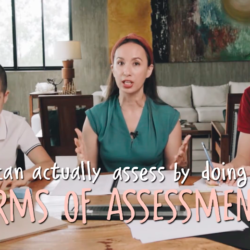The education of their children is one of the biggest responsibilities that parents have. And like many things, it was also affected by the COVID-19 pandemic. With many children still studying from home, more parents are turning to homeschooling as a way to educate them. But before parents and their children can begin their homeschooling journey, there are still many things that they need to consider and choices that they have to make.
According to author, wife, and homeschooling mom Joy Mendoza, there are two main options for homeschooling, which are independent and having an accredited provider.
With independent homeschooling, children will have no records, transcripts, and similar documents, and the parents will be the ones deciding what subjects to study, when to study, and monitor their child’s progress. However, Mendoza says that if you plan to transition your children back into the traditional school system, they will have to be tested by the Department of Education (DepEd) before they return. All students need to have a learning reference number assigned by the DepEd, and schools will also look for this number to verify the level of learning of a child once they are enrolled in a traditional school.
The Philippine Education Placement Test (PEPT) is a test for validating and accrediting knowledge and skills in academic areas gained through informal and non-formal means for re-entry into formal school, which they need to take. But even though independent homeschooling can be risky because there’s no supervision, parents who choose this route can still get help from the Homeschoolers Association of the Philippine Islands (HAPI), which can help independent homeschoolers navigate on their own.
Meanwhile, accredited homeschooling means being homeschooled with an accredited provider and is the option used by most homeschooling parents. In this type of homeschooling, the parents still teach their children and choose what materials to use, but there is accountability. For instance, the books and teaching materials that they select for their children have to be approved by the accredited provider and need to match with the competencies set by the DepEd. This is to help the students make an easy transition when they eventually attend conventional schools.
An advantage of this type of homeschooling is that the accredited provider will issue transcripts and other documents for your children, which they will need when they eventually return to a formal school.
When it comes to choosing an accredited provider, parents should do their research online, check forums, and get feedback from a particular provider. These providers have systems that parents should familiarize themselves with, whether it’s their grading system, the submission of reports, or interacting with the school and the community. Parents can check if they have online orientations to help them decide if they want to continue their homeschooling journey with a certain provider.
Parents should also make sure that a provider’s system fits with their schedule, especially for working parents, who may have limited time when it comes to filling out forms, submitting requirements, and choosing their curriculum.
Mendoza acknowledges that starting your homeschooling journey can be nerve-wracking, but cites the Bible verse in Philippians 4:6-7: “Be anxious for nothing, but in everything by prayer in supplication with thanksgiving present your request to God and the peace of God which transcends all understanding guard your hearts and minds in Christ Jesus.”
The important question that parents should ask themselves before starting their child’s homeschooling is whether they have what it takes to teach their children and teach them well. They can also ask for God’s guidance in guiding them and helping their children as they embark on their learning journey. For more parenting tips, you can watch episodes of Teach with Joy or visit Plus Network on Facebook, Instagram, Twitter, and YouTube.




